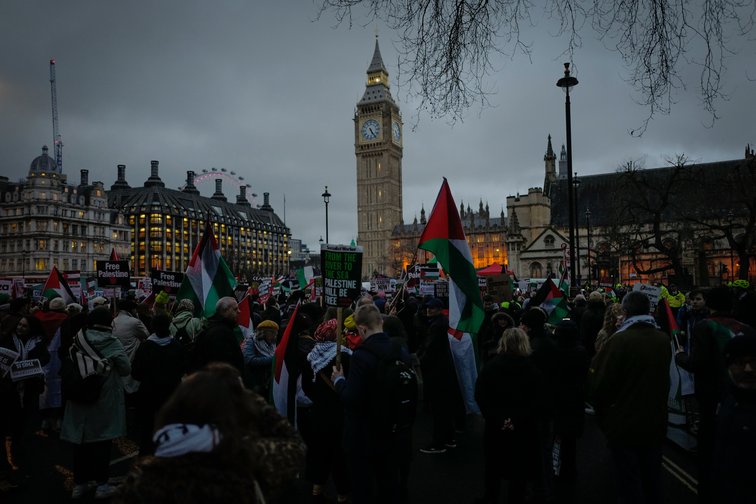Original article by Anita Mureithi republished from OpenDemocracy under a Creative Commons Attribution-NonCommercial 4.0 International licence.

| Alberto Pezzali/NurPhoto via Getty Images
Human rights group Liberty says spotlight on MPs’ safety has seen Tories ‘vilify’ Palestine marchers
Ahuman rights campaign group suing the government for forcing through anti-protest laws says people who go on Palestine marches are being “vilified” to “stoke division”.
Liberty is today challenging the home secretary, James Cleverly, in the High Court over a decision by his predecessor Suella Braverman to introduce new legislation targeting protesters that had already been rejected by Parliament.
The case comes in a week where protest rights are in the spotlight. Pro-Palestine marches are being labelled a threat to MPs and the Home Affairs Select Committee has called on the government to force organisers to give more notice.
Speaking to openDemocracy ahead of the hearing, Liberty director Akiko Hart said: “We’re seeing both our fundamental rights of protest being undermined, but also specific protests like the pro-Palestinian marches being vilified.”
Hart took aim at the “incredibly irresponsible rhetoric from senior politicians where protest is equated to intimidation and harassment”.
MPs’ safety fears were raised last week following chaos in the House of Commons over a symbolic vote on a ceasefire in Gaza. Though some MPs have reported an increase in abuse and threats, campaigners warn that peaceful protests are now being associated with terrorism in order to undermine them.
“There were legitimate concerns around MPs’ safety – obviously, two MPs have been murdered in the last ten years,” she said. “We need to take that very, very seriously. I would also say that it’s MPs who are racialised who are most at risk from harassment, and that’s what the evidence shows us.
“But to conflate harassment with protest, which is what’s happening this week, is really dangerous and irresponsible. There are laws in place to deal with harassment and abuse. That isn’t the same as legitimate protest.”
In its recommendations, the Home Affairs Select Committee said more notice was needed ahead of Palestine marches because the size and frequency of the protests is a burden on police resources. But according to the coalition organising the national Palestine marches, the measures would further limit the right to peaceful protest. Hart also said the current notice period of six days is enough for police to prepare for marches.
“Extending that will just restrict people’s ability to be able to make their voices heard. With this, as with any other issue, the point about protest is that it is not about whether or not you agree – it’s about our right to protest,” she explained.
Liberty was given the green light to sue Braverman in October after she used secondary legislation – which doesn’t get the same level of parliamentary scrutiny – to allow police to restrict or shut down any protest that could cause “more than minor disruption to the life of the community”.
“It shouldn’t be the case that you would have to take the home secretary to court with all the time and effort and energy and expertise that that involves,” said Hart. “The reason we are doing so is because of the then home secretary’s egregious act of circumventing Parliament.”
The government previously tried to insert the new powers into the Public Order Act 2023 in January last year, but was blocked by the Lords.
The point about protest is that it is not about whether or not you agree – it’s about our right to protest
Liberty believes a win “would be a powerful check against any future minister or government that intends to do the same thing”.
Hart told openDemocracy that there have already been clear examples of the impact of anti-protest laws that have come through the Police, Crime, Sentencing & Courts (‘Policing’) Act and the Public Order Act, which both give police more powers to restrict protests.
“There were anti-monarchy protesters who were arrested on the basis that the luggage straps that they were carrying were seen to be tools for locking-on, which was a new offence created under the Public Order Act, but they were carrying them to secure their placards.
“We’re also seeing it in sentencing. Last summer, the Court of Appeal upheld the sentences of the two protesters who scaled the Dartford crossing. And those sentences were two years and seven months, and three years – the harshest sentences ever handed down in modern times around protests around civil disobedience,” she said.
The trial against the home secretary is expected to run for two days at the Royal Courts of Justice in London. Hart told openDemocracy that while she and Liberty’s team of lawyers are feeling optimistic, “there’s a level of underlying exhaustion at how this government is conducting itself and responding to the protests that are happening”.
A Home Office spokesperson said: “The right to peaceful protest is fundamental; the right to disrupt the hard-working public is not.
“We have taken action to give police the powers they need to tackle criminal tactics used by protesters such as locking on and slow marching, as well as interfering with key national infrastructure.
“We work closely with the police to make sure they have the tools they need to tackle disorder and minimise disruption.”
Get OpenDemocracy’s free daily email
Original article by Anita Mureithi republished from OpenDemocracy under a Creative Commons Attribution-NonCommercial 4.0 International licence.